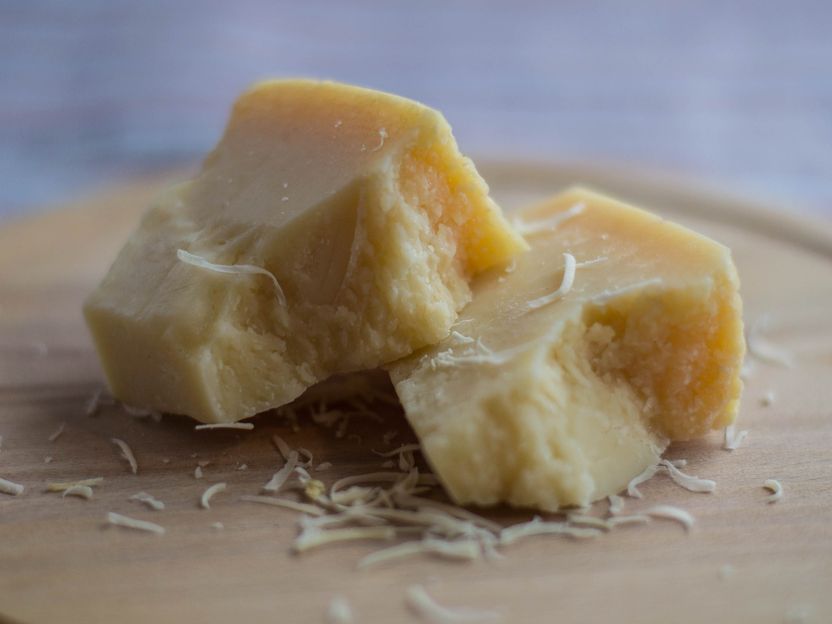Reducing salt in Parmigiano Reggiano cheese might not negatively affect its flavor
Aged cheeses pack a punch of nutty, sharp flavor. Before they're fully mature, aged cheeses are either waxed or placed in brine for weeks to create a natural rind. However, the high salt content in brined cheeses deters some consumers. Now, researchers reporting in ACS food science & Technology present a shortened brining time for Parmigiano Reggiano that results in a less salty product, while still potentially maintaining the cheese's distinctive texture and flavor compounds.

Bild von Anna Lebed auf Pixabay
Parmigiano Reggiano is a lactose-free, crumbly and hard cheese. Manufactured in select provinces in Italy, its protected designation of origin status requires that certain production processes, such as a minimum 12-month ripening period, be performed. Ripening or maturing imparts the cheese's recognizable taste as milk solids are converted to flavor compounds. But before that, cheese wheels are placed in a saturated brine solution for weeks. The added salt plays a key role in the ripening process by modulating microbial growth, enzyme activity and the separation of solids from liquids, hardening the final product. One enzyme-mediated reaction is lipolysis, in which triglyceride fats in milk break down into their key components -- free fatty acids and diacylglycerides. Free fatty acids not only contribute to the taste of the cheese but are also precursors to other flavor molecules. So, Silvia Marzocchi and colleagues wanted to test the impact of brining time on the lipolysis reactions responsible for the free fatty acids involved in Parmigiano Reggiano's flavor profile and distinctive characteristics.
The researchers had five Parmigiano Reggiano dairies brine several cheese wheels by immersing them in a saturated salt solution for either 18 days or a shorter 12-day period. Then the wheels were ripened for 15 months under conditions typical for this type of cheese. Salt content in fully ripened cheese was 9% lower in the samples brined for a shorter time than the group with the longer procedure. Unexpectedly, the researchers found no difference in the moisture level, cholesterol and total fat in the two sets of cheeses. The team also observed no major variations in compounds involved in the flavor profile, as most of the 32 free fatty acids had overlapping concentration ranges between the two groups. Yet in the cheeses with the shorter salting time, overall, the total free fatty acids and the total diacylglycerides concentration ranges were 260% and 100% higher, respectively, than the traditionally brined version, suggesting the lower salt to moisture ratio resulted in more water available to lipolysis reactions and more rapid enzymatic activity breaking down triglycerides. The researchers say a reduced brining time for Parmigiano Reggiano could result in a product appealing to salt-conscious consumers, but sensory tests are still needed to indicate if they can detect differences to the overall taste and texture.
Most read news
Organizations
Other news from the department science

Get the food & beverage industry in your inbox
By submitting this form you agree that LUMITOS AG will send you the newsletter(s) selected above by email. Your data will not be passed on to third parties. Your data will be stored and processed in accordance with our data protection regulations. LUMITOS may contact you by email for the purpose of advertising or market and opinion surveys. You can revoke your consent at any time without giving reasons to LUMITOS AG, Ernst-Augustin-Str. 2, 12489 Berlin, Germany or by e-mail at revoke@lumitos.com with effect for the future. In addition, each email contains a link to unsubscribe from the corresponding newsletter.
















































